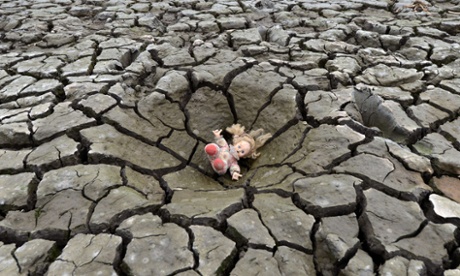Most historians think about the past. Some study the present. Very few, it has to be said, write about the future. But Naomi Oreskes, a Harvard professor in the history of science, believes that our inertia in the face of climate change will puzzle academics for centuries to come.
“The historian of the future will look back on today and ask, what happened? Why didn’t they act on what they knew?” she says in her sunny office in Cambridge, Massachusetts, surrounded by rocks that speak of her own past as a geologist. Oreskes’ latest book,
The Collapse of Western Civilization: A View from the Future, imagines a Chinese scholar in 2393 analysing the slow-motion disintegration of 21
st-century democracies as they fail to tackle a growing environmental catastrophe.
“The book starts from a position of complete factualness, then imagines what might unfold. We’re not expecting all this to happen. We’re saying this is what a worst-case scenario could look like,” Oreskes tells me. It’s not a pretty picture. By the end of the book, co-written with fellow historian Eric Conway, the Netherlands and Bangladesh are submerged, Australia and Africa are depopulated, and billions have perished in fires, floods, wars and pandemics. “A second dark age had fallen on Western civilisation,” Oreskes writes, “in which denial and self-deception, rooted in an ideological fixation on ‘free’ markets, disabled the world’s powerful nations in the face of tragedy.”
The new book follows Oreskes’ and Conway’s (non-fiction) best-seller Merchants of Doubt, in which they painstakingly detailed how a small group of scientists and lobbyists successfully sowed confusion about the dangers of cigarette smoking and climate change. “Merchants of Doubt tried to explain why so many people think that scientists are still arguing when the reality is quite different,” says Oreskes. “This time, we took thousands of pages of IPCC [Intergovernmental Panel on Climate Change] reports and distilled them into a parable about what climate change really means and what it would mean to ignore it, which is more or less what the world has been doing.”
In Merchants of Doubt, mainstream scientists were often the victims, outmanoeuvred by a cabal of pseudo-scientific renegades working alongside industry. In Collapse, Oreskes’ future historian slams the very same experts for pursuing certainty at all costs. “It’s absolutely insane that we don’t have different evidentiary standards for potentially existential threats,” says Oreskes. “There’s no law of nature that tells us that a 95% confidence level is ‘proof’. By demanding an excessively high standard when faced with an existential risk, you could be sentencing the world to experiencing that crisis.”
“Scientists also constantly discuss climate change in the future tense, and have been doing so for 30 years. But some of the things they talked about in the 1970s are happening now. There has to be a point at which you say, yes, heat waves have become more frequent, it’s a statistically significant signal. Maybe not at the 95% confidence level, maybe only 90%, but maybe that’s good enough.”
While scientists take a beating, Oreskes and Conway reserve their greatest ire for politicians and the business community. “ I find it amazing that grown men in suits and ties talk about the magic of the market,” says Oreskes. “If my three-year old did that, I’d call it magical thinking. The reality is that markets are created by people and that markets need governments to sustain them. Without the right structures and institutions, markets degrade into monopolies. Adam Smith knew that. This is not a new insight.”
Their 24th-century historian identifies the "carbon combustion complex": a self-sustaining global network of powerful industries that includes fossil fuel producers, energy companies and manufacturers reliant on cheap energy, but also road builders, banks and PR firms.
“It’s not as if the fossil fuel industry is a free market. The subsidies for it are massive and have been documented by the World Bank. But it’s important to realise this isn’t an obvious conspiracy,” says Oreskes. “And it’s not the fact that they are coordinated that is nefarious, it’s the ends to which they put that coordination: confusion, disinformation and potentially fraud, to stop action on a serious, real problem that potentially effects all of our lives.”
Action is still possible, insists Oreskes. She points to the success of emissions trading schemes in controlling acid rain and believes that a carbon tax could be a powerful force. But time is of the essence. “The longer we delay acting, the worse the problem gets, and the more likely it is that governments will have to intervene in heavy-handed ways.”
In Collapse, Oreskes envisages mid-21st century democratic regimes banning renewable fuels, imprisoning out-spoken scientists and rationing food and water. Eventually, the United States enacts "one child" laws, introduces martial rule and suffers a humiliating merger with Canada. Britain, absent a flooded East Anglia and London, clings to survival as the tide-powered nation of Cambria. Three hundred years from now, China is the world’s only remaining superpower, thanks to rigid population controls, a massive shift to renewable energy and an authoritarian central government.
“The book is meant to be deliberately provocative, of course,” says Oreskes with laugh. “But if you really care about democracy and personal freedoms, you ought to be in the front line to create a market-based solution to fix climate change. The alternative is not one that you’re going to like.”
• The Collapse of Western Civilisation: A View from the Future (Columbia University Press) is published on 1 July, £6.95.









